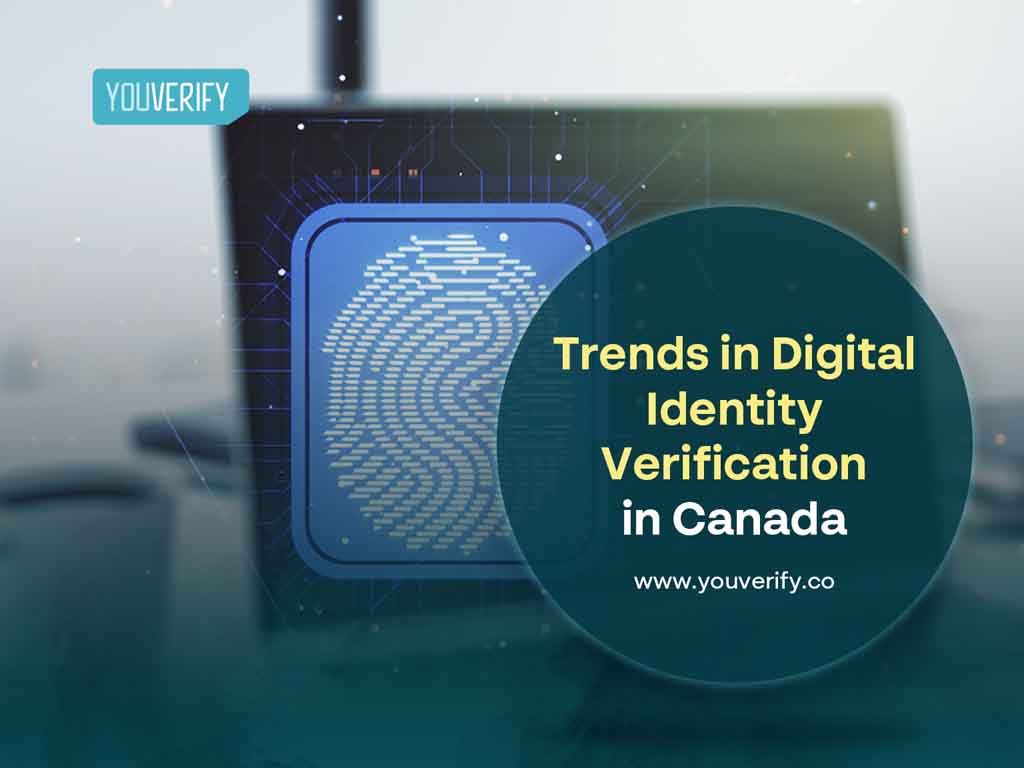Canadians are embracing the digital revolution. From online banking exceeding 85% penetration to e-commerce sales surpassing $100 billion in 2023 according to Emarketer. The need for secure and efficient digital identity verification has become paramount.
Traditional verification methods, relying on physical documents and manual checks, are simply outdated in this digital age. This article explores the exciting trends shaping the future of digital identity verification in Canada, which offers valuable insights for businesses and individuals going through this growing landscape.
What is Digital Identity Verification in Canada
Digital identity verification, or online identity verification, is the process of confirming that someone's online identity is real and accurate. Canadians are increasingly reliant on online platforms for essential services. Financial transactions, government applications (e.g., filing taxes, renewing passports), and even healthcare interactions are moving online.
However, traditional verification methods that rely on physical documents and manual checks are cumbersome and often pose security risks. To address this challenge, the Canadian government, alongside private companies, is actively pushing for the adoption of digital identity verification solutions. Initiatives like the Canadian Anti-Fraud Centre's outreach programs and the Digital Charter emphasize the importance of online safety and user privacy, paving the way for secure digital identity verification solutions.
You might be interested in reading: What is Digital Identity Verification
Key Trends in Digital Identity Verification in Canada
Several key trends are driving innovation in digital identity verification within Canada:
1. Decentralized Digital IDs
Canada's identity system, which relies on a mix of paper and digital options, is undergoing modernization efforts to address security concerns and offer citizens a more convenient way to verify their identity online. The rise of decentralized digital IDs (DDIs) offers a compelling solution. Unlike a centralized system with a single point of access, DDIs store identity data on a secure, distributed network (like a blockchain). This eliminates the risk of a single point of failure and minimizes the potential for data breaches.
Additionally, DDIs empower users to control who has access to their information. They can choose to share specific attributes for different transactions, reducing the risk of identity theft.
2. Biometrics and Document Verification
Biometric verification, using fingerprints, facial recognition, or iris scans, is gaining traction in Canada. These methods offer a more secure and tamper-proof approach compared to passwords or knowledge-based questions. However, concerns regarding data security and potential biases within facial recognition algorithms need to be addressed.
Document verification also plays an important role. Advanced technologies can analyze passports, driver's licenses, and other official documents to ensure authenticity and detect forgeries. The key lies in striking a balance between security and privacy.
Further reading: The Future of Biometrics in Banking
3. AI Enhancements
Artificial intelligence (AI) is revolutionizing the digital identity verification terrain in Canada. Machine learning algorithms can analyze vast amounts of data to identify patterns and anomalies in real-time. This can significantly enhance the accuracy and efficiency of verification processes.
For example, AI can detect fraudulent activity by analyzing login attempts, location data, and user behavior patterns. Additionally, AI can automate repetitive tasks, freeing up human resources to focus on more complex verification aspects. However, it's crucial to ensure responsible development and deployment of AI algorithms, to reduce potential bias and ensure fairness in the online identity verification process.
4. Self-Sovereign Identity
The concept of self-sovereign identity (SSI) is gaining momentum in Canada. SSI empowers individuals to control their own digital identities. Unlike traditional systems where organizations hold and manage identity data, SSI allows users to store their credentials in a secure digital wallet. They can then choose which information to share with different entities for specific transactions.
This enhances privacy by minimizing the amount of data exposed and reduces the risk of identity theft. Furthermore, SSIs empower users to participate more actively in the digital economy, as they can control how their identities are used in online interactions.
5. Interoperability and International Standards
As the Canadian digital terrain evolves, ensuring interoperability and adherence to international standards for digital identity verification becomes important. This refers to the ability of different systems to recognize and accept digital credentials issued by other entities. By adopting internationally recognized standards, Canada can ensure its digital identity framework is compatible with global practices. This facilitates seamless cross-border transactions and encourages collaboration with international partners.
Also, read the trends in digital identity verification in Europe, Nigeria, South Africa, Canada. and in the UK
Conclusion
The digital identity verification terrain in Canada is undergoing a significant transformation. From the growing adoption of biometrics and user-centric solutions like DIDs to potential government-backed programs, these trends highlight a commitment to a secure and user-friendly digital future.
By embracing these trends, businesses can build trust with customers and offer a seamless online experience. Individuals can benefit from enhanced privacy, control over their data, and faster access to essential services. As Canada continues on its digital journey, secure and innovative digital identity verification solutions will play a critical role in unlocking a brighter digital future for all.
Explore the multitude of digital identity verification solutions available to secure your business operations and empower your customers. Youverify Solutions offers a comprehensive suite of secure, compliant, and user-friendly digital identity verification tools tailored to your specific needs. Contact Youverify today to learn more about Youverify Solutions and embrace the future of digital identity verification in Canada!
